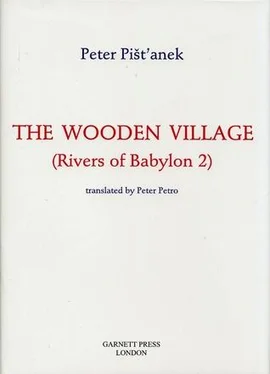Peter Pišťanek - The Wooden Village
Здесь есть возможность читать онлайн «Peter Pišťanek - The Wooden Village» весь текст электронной книги совершенно бесплатно (целиком полную версию без сокращений). В некоторых случаях можно слушать аудио, скачать через торрент в формате fb2 и присутствует краткое содержание. Год выпуска: 2008, Издательство: Garnett Press, Жанр: Современная проза, на английском языке. Описание произведения, (предисловие) а так же отзывы посетителей доступны на портале библиотеки ЛибКат.
- Название:The Wooden Village
- Автор:
- Издательство:Garnett Press
- Жанр:
- Год:2008
- ISBN:нет данных
- Рейтинг книги:3 / 5. Голосов: 1
-
Избранное:Добавить в избранное
- Отзывы:
-
Ваша оценка:
- 60
- 1
- 2
- 3
- 4
- 5
The Wooden Village: краткое содержание, описание и аннотация
Предлагаем к чтению аннотацию, описание, краткое содержание или предисловие (зависит от того, что написал сам автор книги «The Wooden Village»). Если вы не нашли необходимую информацию о книге — напишите в комментариях, мы постараемся отыскать её.
The Wooden Village — читать онлайн бесплатно полную книгу (весь текст) целиком
Ниже представлен текст книги, разбитый по страницам. Система сохранения места последней прочитанной страницы, позволяет с удобством читать онлайн бесплатно книгу «The Wooden Village», без необходимости каждый раз заново искать на чём Вы остановились. Поставьте закладку, и сможете в любой момент перейти на страницу, на которой закончили чтение.
Интервал:
Закладка:
Feri is sitting at a table with the two gypsy stokers. They play cards for money: Piggybank the skinflint can only look on. From the hovel comes the sound of an aroused Fraňo Fčilek, their last customer, whose heavy breathing is drowned out by Lady’s heavy continuous coughing. Feri screws up his eyes to assess what his hand is worth and says: “Another card.” He wonders if he shouldn’t after all take Lady at night to the hospital round the corner. He would only have to ring the bell and then run for it, leaving her on the stairs. But when he realises the things she might tell them about her stay with Feri and Eržika, he quickly changes his mind. He looks at the gypsies, but they don’t react to Lady’s cough. They don’t care; they peer at their greasy, well-used cards. For them, she’s just a gadjo cunt; she can croak, for all they care. Berki and Šípoš make their money and don’t care about anything else. Let the gadjos do what they like to their women, they can even kill them; what interest is it to them, they’re good gypsies.
“The whole bank!” yells Bartaloš and taps his cards with his nails.
Berki keeps the bank; he slips Feri another card. Šípoš smiles, he passes. Feri takes the card, hides it behind the ones in his hand and slowly uncovers it. You can feel the tension, as they say. Water drips regularly from some joint, and the hot water boiler roars monotonously. From the hovel comes the sound of a squeaking bed and intercourse. Feri’s face is bland, but his eyes shine with contentment. “Thanks, I’m fine,” he says, and takes one more look at his cards as if trying to make sure for the last time that his eyes aren’t deceiving him. The gypsy holding the bank begins to show his hand. He first turns over the first card, the jack of clubs. He adds a jack of spades to it: four. Then queen of hearts: seven. He adds seven of spades: fourteen. Berki licks his finger to gain time and prolong Feri’s torment.
“A seven of diamonds: twenty-one,” says Berki. Feri silently throws down his cards.
The banker right away tries to add up the cash in the bank. “Two thousand eight hundred and forty crowns,” he reports. Bartaloš doesn’t have that kind of money to hand. He pays some of it from the till, but has to get the rest from the savings bank. When he wins it back, he will put back all the money in their joint savings account.
Soon Feri comes back with the money. He puts the money he lost in the bank, but since he’s taken out more, just in case, they go on with the game. Fraňo Fčilek is still tormenting Lady; he prolongs his pleasure like a gourmet, to make it last as long as possible.
After a few insignificant games, Feri gets a seven of diamonds, a trick card. He sees it as a good omen and goes for the bank. He gets a ten, so altogether he has twenty-one. A feeling of happiness comes over his soul. He will be able to put back at least a fraction of the money into Feri’s and Eržika’s account. He stacks his cards in his palm and calmly observes the game developing. Berki, the banker, follows him. His first card is an ace of spades and the second is an ace of diamonds. A golden hand! Feri has to run to the savings bank again.
He returns and pays off his debt; his hands are trembling like an old man’s. They go on gambling, but not for long. In the next round, Šípoš challenges the bank and has twenty in his hand; the banker has only nineteen. The banknotes and coins pass to the gypsy’s wallet. Feri rages inwardly; he is so angry he could cry.
Fraňo Fčilek is by now satisfied; he’s finished with Lady and is leaving. Feri asks Freddy to get Eržika: Lady needs to be washed.
Eržika comes to the boiler-room and enters the hovel. She goes up to Lady. Lady looking at her indifferently; she doesn’t cough. Her white teeth seem dry in her half-open mouth. One of her artificial eyelashes has peeled off and hangs from a corner of her eye. Her shrivelled breasts and flat sunken belly are covered by a few cooling shots of Fčilek’s semen.
“So how goes it, Lady?” Eržika asks. “Was it good?”
Lady doesn’t react. Eržika takes a closer look. She notices that Lady’s enfeebled chest is not moving. Eržika places her hand below the left breast, trying to feel her heart beat. But the heart is silent. “FERI!” screams Eržika in panic, wiping her hand on her apron.
Feri throws the cards down on the rough table and runs into the hovel. Freddy Piggybank follows him. Eržika is standing terrified, frozen over Lady’s corpse. Her eyes shed genuine tears. She turns to Feri. It is as if her best friend has died. Feri instantly understands everything. He quietly draws Eržika to himself.
Freddy looks at the dead woman with interest. He wonders if Fčilek had sex with her while she was alive, or if his pleasure was achieved on a cadaver. This sends him into a daydream. He is trying to imagine what it would feel like to do it with a dead woman. A woman in that state would not laugh at him for having such a small penis.
* * *
Fraňo Fčilek is collecting beer glasses at The Hunter’s Inn. When Feri comes and grabs him by his collar, he lets himself be dragged into a storage room. “Have you gone cwazy, Fewi?” he explodes when he hears what Feri’s accusing him of. He wriggles free of Feri’s clutches: “I scwewed her as usual,” he says. “And then she suddenly stopped bweething. Maybe she came. I’m no murdewer!”
Proud Feri Bartaloš sits down: he’s had it.
“So she’s dead, is she?” asks Fčilek with concern. “So I won’t be scwewing her any more. Too bad. But of course,” he adds, “I’m not a gwass, I’ll keep as quiet as the gwave. But you owe me the money for six scwews; that makes six hundwed cwowns.”
Feri tells Fčilek that if he ever opens his big mouth, then he’ll be jailed too: he was Lady’s last customer. The killer nods. He understands perfectly. But when will Feri give him back his six hundred crowns?
When Feri gets back to the boiler-room, the question arises of what to do with Lady. Eržika suggests that Feri should carry her at night to the Two Lions police station and leave her there on the steps.
“You bloody cunt!” rages Feri. “You stupid cunt! What if they start looking for her? They’ve already been; they called on Piggybank.” And you can be sure they’ll get round to us, too!” In Feri’s opinion the body has to disappear. But how? Feri sits down and props his chin on his hand.
The bewildered gypsies reject proud Feri Bartaloš’s suggestion. They register their disagreement by throwing up their hands and their panicky eyes turn into balls in their olive faces. “Can’t be done! Can’t be done! Not that!” They’re good gypsies and won’t have it. If they burned the gadjo cunt in the furnace, her spirit would stay here forever and haunt them, they’re good gypsies who have wives and children, hungry mouths to feed, and they’re afraid. Šípoš’s lower jaw is quivering and Berki’s face seems to be drained of blood. Both shake their heads in refusal, waving the apparent danger away with their arms. Let the dilino gadjo , the stupid white man, take the dead gadjo cunt’s body away with him; they’re good gypsies and won’t have anything to do with it.
Only a few people go to the secret funeral in the depth of night: Eržika, Feri, Freddy Piggybank, Fraňo Fčilek, and a few of Lady’s admirers. Lady’s body is in a black plastic bag mounted on a metal frame, which serves as a rubbish skip in the Wooden Village. An open skip waits for its booty. They are all silent, looking round to check that no police car is about. Eržika grabs Feri’s forearm and trembles as she cries. Fčilek and Piggybank lift up the bag with Lady in it, after Feri gives a silent sign, more a plea than a command. Soon Lady rests on a layer of used plastic trays, cups, old bones, rotten fruit, cans and paper. One by one, the funeral attendants go up to the container, and each one dumps their rubbish over her. Soon the corpse is totally covered. The dustmen will come in the morning and empty the skip. All that will remain of Lady will be a memory. The silence of those present is broken only by Eržika’s plaintive cry. Feri, stony-faced, taut-lipped, pats her hand; he understands Eržika’s grief. They had both got used to her. The silence almost begs to be broken, but no one wants to say anything. Fraňo Fčilek would like to remind them of his six hundred crowns, but he bites his tongue.
Читать дальшеИнтервал:
Закладка:
Похожие книги на «The Wooden Village»
Представляем Вашему вниманию похожие книги на «The Wooden Village» списком для выбора. Мы отобрали схожую по названию и смыслу литературу в надежде предоставить читателям больше вариантов отыскать новые, интересные, ещё непрочитанные произведения.
Обсуждение, отзывы о книге «The Wooden Village» и просто собственные мнения читателей. Оставьте ваши комментарии, напишите, что Вы думаете о произведении, его смысле или главных героях. Укажите что конкретно понравилось, а что нет, и почему Вы так считаете.












